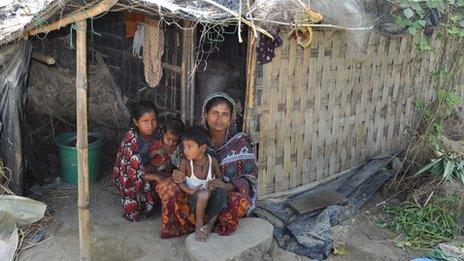Rohingyas and Bangladeshis risk perilous journeys
- Published

Sameera Begum could not sleep on the night when her husband took a risky wooden boat journey to go to Malaysia. But the dreadful news came in the morning.
Her husband, Mohammad Firoz, was among those who went missing after a boat overloaded with more than 100 illegal migrants capsized off the coast of Teknaf, in south-eastern Bangladesh.
There were only a few survivors and the fate of most of the passengers is still not known.
Dozens of people die every year when boats carrying illegal migrants, mostly job-seeking Bangladeshis and Burmese Rohingya Muslim refugees, keel over in the high seas.
Sitting outside her small shack on the beach, Sameera Begum still keeps gazing at the sea hoping that her husband might come back.
"I pleaded with him not to go on this dangerous boat journey," says 22-year-old Sameera.
"But he said he wanted a better future for our three children and will come back after three years with money. I don't know whether he is still alive or not."
Considered a burden
She is among thousands of Rohingya Muslim refugees from neighbouring Burma living along the coast of Cox's Bazar on the south-eastern coast of Bangladesh.
Sameera's family fled Burma's Rakhine state a few years ago during an outbreak of violence.
But they are not wanted in Bangladesh either. It has been pushing the refugees back into Burma, saying it cannot afford to take in any more of them.
"We were chased out of Burma and we are not wanted here in Bangladesh. Where will we go? How can I survive with my three children now?" Sameera asks.
The United Nations describes Rohingyas as a persecuted religious and linguistic minority from western Burma. The Burmese government, on the other hand, considers them as illegal immigrants from Bangladesh.
Human traffickers
Tens of thousands of Rohingyas who crossed into Bangladesh in the past three or four decades have been living in camps along the border. Though they share close cultural and linguistic ties with Bangladesh, the authorities consider them a burden.
Bangkok-based Human Rights Watch spokesman Phil Robertson says that is clear that a "significant number" of Rohingyas are fleeing Rakhine state and getting on boats to Malaysia or Thailand.
"These people are desperate," Mr Robertson says.
"They have no other choice and very few options. They feel that they need to flee for their lives."
But not all those going on the ill-equipped trawlers or fishing boats are Rohingya refugees. Officials say a majority are Bangladeshis who want to emigrate illegally to Malaysia or other countries.
"We came to know from some of the survivors that only 30 to 40% of passengers on these boats were Rohingya refugees. The rest were all Bangladeshis," Lt Col Zahid Hassan from the Border Guard Bangladesh (BGB) in Teknaf told the BBC.
He said that Rohingyas first started going on boats to south-east Asia in the 1990s. Only more recently have Bangladeshi youths begun joining them on the dangerous voyage.
"These youngsters are not only from Greater Chittagong, They are coming from all parts of Bangladesh. With the help of human traffickers, they have been attempting to go to Malaysia to find jobs," Lt Col Hassan says.
Fragility on the high seas
Human traffickers charge around $1,000 (£600) to take Bangladeshis and Burmese refugees to Malaysia or Thailand by boat. It takes about 10 to 12 days to reach the destination.
The busiest season for human trafficking is from October to March when the sea normally remains calm and boats can travel without much difficulty.
After much persuasion, a human trafficker in the Teknaf area agreed to talk to the BBC. But he did not want to be pictured and he has not been named.
"People come and plead with me to send them to Malaysia or other countries," he said.
"From the coast we take them by a small boat and then shift them to a bigger vessel in the deep sea. If I find another job, I will leave this profession."
He got involved in human trafficking about six months ago and has sent more than 200 people so far to south-east Asia.
"I feel bad when people die in boat accidents," he said.
"I go and tell their family members that they have drowned in the sea. What else can I do? It was God's wish they had to die, so they died."
Local people say that a boat carrying illegal migrants leaves the southern coast of Bangladesh two or three times a month and rarely gets stopped. But some estimates suggest that the fragility of the vessels on the high seas means that only half actually reach their destination.
The authorities insist that they have taken sufficient measures to prevent illegal migrants from leaving the coast.
But rights groups warn that following recent violence in Burma, more Rohingyas may attempt to go on these dangerous journeys in record-breaking numbers.
"This is a perilous situation and the international community needs to address it," Mr Robertson says.
In the meantime, all that Sameera Begum can do is hope some day to hear from her loved one.
- Published9 November 2012
- Published28 October 2012
- Published3 July 2014